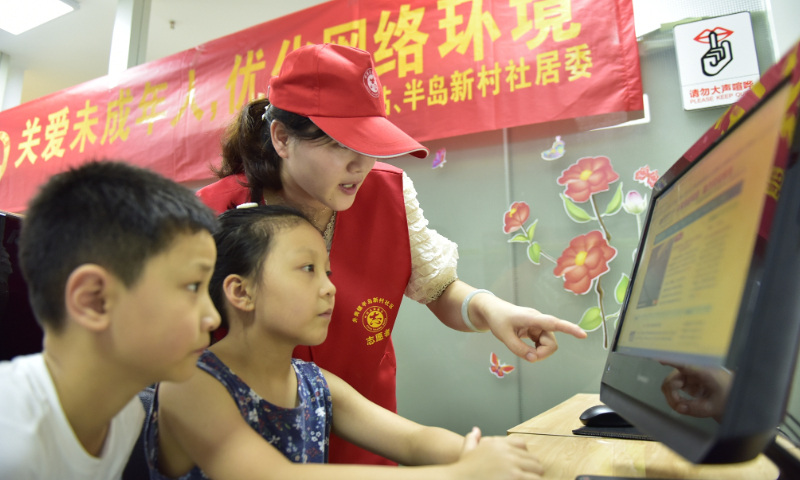ARTS / CULTURE & LEISURE
Cyberspace umbrella Operation Qinglang protects minors during summer

A community volunteer explains internet safety knowledge to children in Hefei, Anhui Province. Photo: VCG
Aimed at ensuring a healthy online environment for minors, the latest edition of a special campaign named Operation Qinglang was recently launched in China. Set to last two months, this iteration of the campaign has a unique focus: Remove online content that is harmful to minors during the 2024 summer season.
Around for several years, Operation Qinglang saw fruitful results as early as 2016. That year, around 1,045,000 online accounts were banned for producing content that was either obscene, violent or contained rumors.
"Removing harmful online contents is only part of the operation's goal, it is like a big umbrella that covers many other sectors like telecom network fraud and infringement of people's personal information," Dou Saiming, a cultural policy expert, told the Global Times.
If this cyberspace "umbrella" can cover all-round sectors, then why is the current operation to safeguard underage online users needed during the summer holiday season in particular?
The answer to this question is multi-faceted and has much to do with the timing and the targeted subjects.
First of all, the summer season is a good time to spot and deal with harmful problems online. During the summer school break, the number of minor internet users significantly increase, and this can inspire online creators in industries such as gaming and livestreaming to provide them with more tailored content, within which some are good, but others harmful.
In other words, the summer season period is like a net that catches all the good and bad fish. The operation has identified six specific sectors where those bad fish can be caught in its net.
The six sectors are "short video and livestreaming," "social media sites," "e-commerce platforms," "application stores," "smart devices for children" and "digital platform's minor mode."
Taking e-commerce platforms as an example, animation inspired toys with pornographic features are on sale that can potentially be bought by school kids. Also, some stationery products for students are deliberately designed with violent imagery and dirty slogans that are often seen in the adult world.
These items are extremely poisoning since some minor consumers may not have wanted to look for them, but passively encounter these products when simply searching for "stationery" or "animation toys."
"Minors are curious beings but their judgement on things is not always right, so we cannot afford to think about what would happen if they are intrigued by such things and also start to like them," Xu Shuming, a cultural sociologist, told the Global Times.
Including "e-commerce," each one of these sectors has been identified with clear problems that must be tackled. For instance, smart devices for children are not allowed to provide photo services for minors that can be used to compare their appearance with each other or that provide superstitious services like fortune telling.
On the one hand, the operation's niche and detailed regulations reveal that safeguarding minors online is not easy and often deals with a handful of case-to-case scenarios. On the other hand, these regulations show China's dedication and its efforts to provide a better online environment for young people.
"We have to admit that today's developing digital technologies can also create difficulties for us to protect our children online. Many sugar-coated harmful things can even fool us. So, periodical operations like this are very important for removing problems quickly," Dou emphasized.
Operation Qinglang has always been attentive of minors' safety online, especially in 2020, when the summer season edition of the program was first launched.
However, simply introducing policies is not sufficient to protect minors online. What's more important is a triangular defense design formed by policy, platforms and also educational organs like schools and parents. Minors should be the focus of these three pillars.
In other words, parents at home and teachers at school should pay more attention to children's online activities. Also, various platforms should implement the regulations initiated by campaigns like Operation Qinglang.
"In a very straightforward sense, platforms should prioritize kids over profit when following these regulations," Dou told the Global Times.
The author is a reporter with the Global Times. life@globaltimes.com.cn



